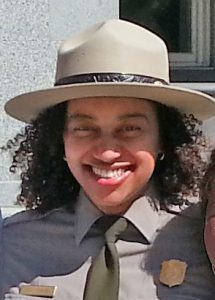This episode of the Park Leaders Show is a part two of sorts. My interview with Kelli English was so wonderful and long that I broke it into two parts. The first part of our conversation was about interpretation and storytelling. You can find it here.

With the second half of our interview, Kelli talks about growing up in the south side of Chicago and how she ended up telling stories as an interpreter in Yellowstone National Park. She also discusses the different perspective she has being an African American interpreter. She is aware of the stories told in parks that can connect different communities to parks. Stories that are not mainstream can have a tremendous impact on the people who hear them.
Communities of color are interested in hearing the same stories other visitors are interested in hearing, but they also want to hear stories about their history when it is present in the park.
Kelli shares stories that may open your eyes to why parks have not always been open and welcoming to all people. Discriminatory attitudes and practices from the past still have a deep impact on perceptions and use of parks today.
Our National, State, and local parks are the caretakers of American History. We have an obligation to tell stories, good and bad, that have impacted our life. Kelli offers insight into how and why we should share even the negative stories of our past.
Kelli discusses an exhibit that changed her life. The book about the exhibit is Without Sanctuary by James Allen and John Lewis.